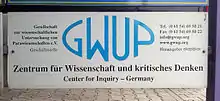Registered association (Germany)
An eingetragener Verein (German: [ˈaɪnɡəˌtʁaːɡənɐ fɛʁˈʔaɪn], registered association or incorporated association), abbreviated e. V. (German: [ˈeː ˈfaʊ]), is a legal status for a registered voluntary association in Germany. While any group may be called a Verein, registration as eingetragener Verein confers many legal benefits, because it confers the status of a juridical person rather than just a group of individuals. The legal status must be mentioned in the name as well. Like certain other corporate bodies, a eingetragener Verein can apply for the status of a charitable organization (Gemeinnützigkeit).

Legal basis
The Civil Code of Germany regulates registered non-profit, and for-profit associations regarded as juridical persons (Vereine) in sections 21–79 and any other associations by contract (Gesellschaften in sections 705–740. The Verein is the basic type of a juridical person while the Gesellschaft is dogmatically more a partnership. Due to this theoretical distinction, the concept of Verein is also the legal basis for particular economic entities (Kapitalgesellschaften) such as GmbH and Aktiengesellschaft, which are also endowed with juridical personhood. These are regulated in separate statutes as special economic associations but bear the same basic features.
The Gesetz zur Regelung des öffentlichen Vereinsrechts (VereinsG) (Act regulating the public law of associations) and the associated regulations Verordnung zur Durchführung des Gesetzes zur Regelung des öffentlichen Vereinsrechts (Vereinsgesetz) contain specific provision on the rights and duties of Vereine in general.
Membership
All natural and juridical persons in Germany, including entities such as municipalities, counties and other entities under public law, can form associations and be member of an association. This means that associations are not limited to private clubs formed by natural persons but have a much broader scope. They can be very locally limited club-like institutions but also nationwide units representing important economocic or social groups. It is even possible that registered associations themself form a new association whose membership is composed entirely of associations (often called Dachverband).
The statutory minimum number of members for forming a registered association is seven. The minimum number of members before a registered association needs to be dissolved is five. The largest associations can have over one million members, there is no legal limit concerning membership numbers.

Registration
The registration of Vereine is regulated in the Vereinsregisterverordning VRV[1] (Regulations for the registry of associations). It requires registration of an e. V. with the association registry (Vereinsregister) either kept at the district court of its seat or, if directed by state law, as a centralized register for the Land its seat is located in.
Differences to other jurisdictions
In other German-speaking countries such a distinction does not exist. But there may be legal requirements which oblige an association to register itself; for example, in Switzerland there is no association registry, but an association must be listed in the commercial register if its yearly turnover is high enough to legally require an audit (Revisionspflicht). In Austria, all associations are registered in a special register, and having an e. V. in the name is not allowed.[2]
References
- "Vereinsregisterverordnung". Gesetze im Internet - VRV (in German). Federal Ministry of Justice. Retrieved 23 January 2020.
- http://www.bmi.gv.at/cms/BMI_Vereinswesen/faq/Frage_01.aspx
Further reading
- "Eingetragener Verein" [Registered association]. Rechtswörterbuch.de (in German). Archived from the original on 2012-09-18.
- "German Civil Code (BGB)". Gesetze im Internet - German Civil Code BGB. Federal Ministry of Justice. Retrieved 23 January 2020.
- "Gesetz zur Regelung des öffentlichen Vereinsrechts" [Act for the Regulation of Public Association Law]. Gesetze im Internet (in German). Federal Ministry of Justice. Retrieved 23 January 2020.
- "Verordnung zur Durchführung des Gesetzes zur Regelung des öffentlichen Vereinsrechts (Vereinsgesetz)" [Regulations for the Enforcement of the Act Regulating Public Association Law]. Gesetze im Internet - VereinsGDV (in German). Federal Ministry of Justice. Retrieved 23 January 2020.